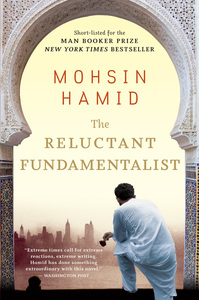Take a photo of a barcode or cover
reflective
medium-paced
Plot or Character Driven:
Plot
Strong character development:
Yes
Loveable characters:
Complicated
Diverse cast of characters:
Yes
dark
reflective
tense
medium-paced
Plot or Character Driven:
Plot
Strong character development:
Complicated
Loveable characters:
No
Diverse cast of characters:
No
Flaws of characters a main focus:
Yes
A first-person novel of love and disillusionment from a Pakistani man making a living at a prestigious valuation firm in New York around the turn of the millennium. There’s a framing device throughout, which somehow really worked. Loved the polite and sarcastic voice of the narration, particularly in the audiobook. Works well as a coming-of-age story, and shows a clash of worlds between international finance and its impact on a Pakistani man. However, it also definitely leans pretty heavily on broad sensationalism and provocation. Written a few years into the “War on Terror”, it also felt a little dated reading it now and felt stereotypical as a portrait of a radicalized Muslim. Curious to see how they did the movie. In the end, I’m not sure who exactly this is for, or whether it was effective in its message… but it was an interesting read and I’m interested to learn more about the reactions to this book and other perspectives on it. Especially as it may have shifted for different audiences over time.
““I love it when you talk about where you come from,” she said, slipping her arm through mine, “you become so alive.””
“She ordered a beer; I did the same. “So what’s Pakistan like?” she asked. I told her Pakistan was many things, from seaside to desert to farmland stretched between rivers and canals; I told her that I had driven with my parents and my brother to China on the Karakoram Highway, passing along the bottoms of valleys higher than the tops of the Alps; I told her that alcohol was illegal for Muslims to buy and so I had a Christian bootlegger who delivered booze to my house in a Suzuki pickup. She listened to me speak with a series of smiles, as though she were sipping at my descriptions and finding them to her taste. Then she said, “You miss home.””
“Every fall, Princeton raised her skirt for the corporate recruiters who came onto campus and—as you say in America—showed them some skin. The skin Princeton showed was good skin, of course—young, eloquent, and clever as can be—but even among all that skin, I knew in my senior year that I was something special. I was a perfect breast, if you will—tan, succulent, seemingly defiant of gravity—and I was confident of getting any job I wanted.”
“At Princeton, learning was imbued with an aura of creativity; at Underwood Samson, creativity was not excised—it was still present and valued—but it ceded its primacy to efficiency. Maximum return was the maxim to which we returned, time and again.”
“Focus on the fundamentals. This was Underwood Samson’s guiding principle, drilled into us since our first day at work. It mandated a single-minded attention to financial detail, teasing out the true nature of those drivers that determine an asset’s value. And that was precisely what I continued to do, more often than not with both skill and enthusiasm.”
“I had always thought of America as a nation that looked forward; for the first time I was struck by its determination to look back. Living in New York was suddenly like living in a film about the Second World War; I, a foreigner, found myself staring out at a set that ought to be viewed not in Technicolor but in grainy black and white.”
“[The American Flag] invaded New York after the attacks; it was everywhere. Small flags stuck on toothpicks featured in the shrines; stickers of flags adorned windshields and windows; large flags fluttered from buildings. They all seemed to proclaim: We are America—not New York, which, in my opinion, means something quite different—the mightiest civilization the world has ever known; you have slighted us; beware our wrath.”
“I was not at war with America. Far from it: I was the product of an American university; I was earning a lucrative American salary; I was infatuated with an American woman. So why did part of me desire to see America harmed? I did not know, then; I knew merely that my feelings would be unacceptable to my colleagues, and I undertook to hide them as well as I could.
“I was struck by how traditional your empire appeared. Armed sentries manned the check post at which I sought entry; being of a suspect race I was quarantined and subjected to additional inspection; once admitted I hired a charioteer who belonged to a serf class lacking the requisite permissions to abide legally and forced therefore to accept work at lower pay; I myself was a form of indentured servant whose right to remain was dependent upon the continued benevolence of my employer.”
“Commensurate with our status as the world’s sixth most populous country, we Pakistanis tend to take an inordinate pride in our food.”
“What a contrast, again: the delicacy of their perfume against the robust smell of roasting meat! It is remarkable indeed how we human beings are capable of delighting in the mating call of a flower while we are surrounded by the charred carcasses of our fellow animals—but then we are remarkable creatures. Perhaps it is in our nature to recognize subconsciously the link between mortality and procreation—between, that is to say, the finite and the infinite—and we are in fact driven by reminders of the one to seek out the other.”
— The Reluctant Fundamentalist by Mohsin Hamid
https://a.co/1PD9Ep4
““I love it when you talk about where you come from,” she said, slipping her arm through mine, “you become so alive.””
“She ordered a beer; I did the same. “So what’s Pakistan like?” she asked. I told her Pakistan was many things, from seaside to desert to farmland stretched between rivers and canals; I told her that I had driven with my parents and my brother to China on the Karakoram Highway, passing along the bottoms of valleys higher than the tops of the Alps; I told her that alcohol was illegal for Muslims to buy and so I had a Christian bootlegger who delivered booze to my house in a Suzuki pickup. She listened to me speak with a series of smiles, as though she were sipping at my descriptions and finding them to her taste. Then she said, “You miss home.””
“Every fall, Princeton raised her skirt for the corporate recruiters who came onto campus and—as you say in America—showed them some skin. The skin Princeton showed was good skin, of course—young, eloquent, and clever as can be—but even among all that skin, I knew in my senior year that I was something special. I was a perfect breast, if you will—tan, succulent, seemingly defiant of gravity—and I was confident of getting any job I wanted.”
“At Princeton, learning was imbued with an aura of creativity; at Underwood Samson, creativity was not excised—it was still present and valued—but it ceded its primacy to efficiency. Maximum return was the maxim to which we returned, time and again.”
“Focus on the fundamentals. This was Underwood Samson’s guiding principle, drilled into us since our first day at work. It mandated a single-minded attention to financial detail, teasing out the true nature of those drivers that determine an asset’s value. And that was precisely what I continued to do, more often than not with both skill and enthusiasm.”
“I had always thought of America as a nation that looked forward; for the first time I was struck by its determination to look back. Living in New York was suddenly like living in a film about the Second World War; I, a foreigner, found myself staring out at a set that ought to be viewed not in Technicolor but in grainy black and white.”
“[The American Flag] invaded New York after the attacks; it was everywhere. Small flags stuck on toothpicks featured in the shrines; stickers of flags adorned windshields and windows; large flags fluttered from buildings. They all seemed to proclaim: We are America—not New York, which, in my opinion, means something quite different—the mightiest civilization the world has ever known; you have slighted us; beware our wrath.”
“I was not at war with America. Far from it: I was the product of an American university; I was earning a lucrative American salary; I was infatuated with an American woman. So why did part of me desire to see America harmed? I did not know, then; I knew merely that my feelings would be unacceptable to my colleagues, and I undertook to hide them as well as I could.
“I was struck by how traditional your empire appeared. Armed sentries manned the check post at which I sought entry; being of a suspect race I was quarantined and subjected to additional inspection; once admitted I hired a charioteer who belonged to a serf class lacking the requisite permissions to abide legally and forced therefore to accept work at lower pay; I myself was a form of indentured servant whose right to remain was dependent upon the continued benevolence of my employer.”
“Commensurate with our status as the world’s sixth most populous country, we Pakistanis tend to take an inordinate pride in our food.”
“What a contrast, again: the delicacy of their perfume against the robust smell of roasting meat! It is remarkable indeed how we human beings are capable of delighting in the mating call of a flower while we are surrounded by the charred carcasses of our fellow animals—but then we are remarkable creatures. Perhaps it is in our nature to recognize subconsciously the link between mortality and procreation—between, that is to say, the finite and the infinite—and we are in fact driven by reminders of the one to seek out the other.”
— The Reluctant Fundamentalist by Mohsin Hamid
https://a.co/1PD9Ep4
hopeful
informative
mysterious
reflective
sad
fast-paced
Plot or Character Driven:
Character
Strong character development:
Complicated
Loveable characters:
Complicated
Diverse cast of characters:
Yes
Flaws of characters a main focus:
Complicated
lighthearted
mysterious
reflective
fast-paced
Plot or Character Driven:
A mix
Strong character development:
Yes
Loveable characters:
No
Diverse cast of characters:
Complicated
Flaws of characters a main focus:
Complicated
challenging
mysterious
reflective
sad
slow-paced
Plot or Character Driven:
Character
Strong character development:
Complicated
Loveable characters:
Complicated
Diverse cast of characters:
Yes
I listened to the audiobook which, given that the entire narrative is a conversation, made the experience engrossing. I found the novel thought provoking and well written with very interesting insight into a non-American's perspective of 9/11's aftermath.
medium-paced
Plot or Character Driven:
Character
Strong character development:
Yes
Loveable characters:
Complicated
Diverse cast of characters:
Yes
Flaws of characters a main focus:
Complicated
A novel narrative style, goodies quite engaging. I never lost sight of the “unreliable narrator“ problem, a note added to the intrigue. It lost a star because it was easy to put down, and hard to pick up. While a lovely book, it didn’t compel me to read more.
dark
mysterious
reflective
tense
fast-paced
Plot or Character Driven:
Character
3.7
Lectura molt àgil i àcida. Escrit al 2007, 6 anys després de l'11s. Una visió que queda entre dos móns, ja que l'escriptor és occidentalitzat. Molt recomanable.
Lectura molt àgil i àcida. Escrit al 2007, 6 anys després de l'11s. Una visió que queda entre dos móns, ja que l'escriptor és occidentalitzat. Molt recomanable.



